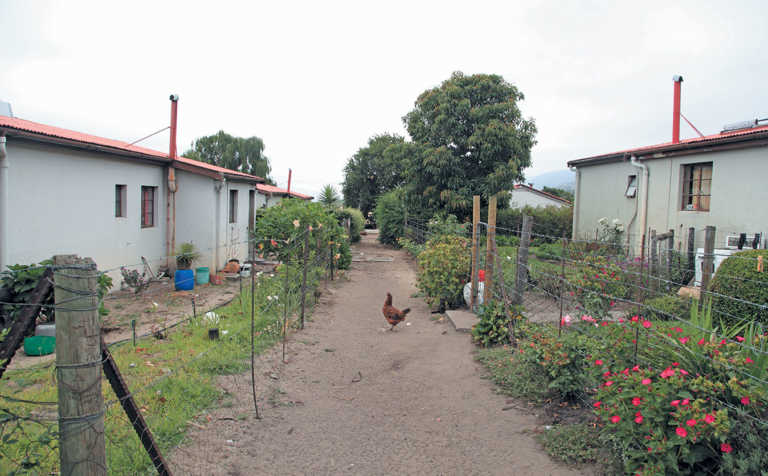
Photo: Glenneis Kriel
Farmers are frequently criticised for trying to remove illegal occupants from their land. This is often unfair, according to Peter de Wet, owner of Excelsior Wine Estate near Ashton in Langeberg. He spoke to Glenneis Kriel about his own experience of this issue, and his views on worker housing
Excelsior Wine Estate recently received negative publicity after attempting evictions from farm dwellings. What exactly happened?
We verbally informed two sisters, Josina and Miriam Gova, that they had to look for alternative lodgings. They used to live with their mother, Emily, who passed away more than two months before we had this talk.
Emily’s right of tenure had already been controversial, as she was never a full-time employee. Her right of tenure was based on her husband, who passed away more than 30 years ago after having worked on the farm. We granted her accommodation because we felt it was the right thing to do.
This was long before the Extension of Security of Tenure Act [Esta] came along.
Have you supplied the Govas with an eviction order?
No, we informed them that they had to start looking for alternative lodgings. We didn’t set a date or any other conditions. Instead of negotiating with us, they went to an NGO, which persuaded them to go to the media. The next thing we knew, the farm was featured in a rather negative article that made sweeping statements about how we treat our workers.
How does this situation affect you and the estate?
Negative publicity can be very damaging, not only to us, but to the wine industry as a whole. It makes us look as if we’re ill-treating and taking advantage of our employees, which really is not true.
This, in turn, can have a negative impact on local and international sales, with a knock-on effect on farm employment. The wine industry is a major generator of foreign income, so reduced sales also have a negative impact on the greater economy.
We would have liked to negotiate a favourable outcome with the Govas. The case will now probably end up in court. This will come at no cost to the Govas, as government makes provision for their legal representation, but it will cost us time and legal fees to have them evicted, even though they have no legal right to live on the farm.
Would you say the Esta is to blame for this situation?
No. Most producers don’t have a problem with Esta’s stipulations, but with how Esta is interpreted and manipulated. For example, in the Breede River Valley, there’s a judge who will not evict a mother with children, even though she might be occupying a house illegally according to the legislation.
Then there’s the time it takes to implement an eviction.
A case like this can drag on for four to six years, while some of your own employees have to forego the housing benefit.
Excelsior Wine Estate has 230ha planted to wine grapes and 40ha under citrus production.
We press around 2 500t of wine grapes per year. We have 70 full-time employees and 61 houses that accommodate 283 people.
Farmers are legally required to prevent overcrowding, but have no power to evict illegal occupants.
Nobody in the real world can afford to have people living in their houses for free; why should farmers be the exception? Farmers generally react to this by not building any more new houses on their properties and bulldozing houses when they become vacant.
In our municipal area, on-farm dwelling is really no longer necessary as farms are relatively close to towns.
The biggest hitch, however, is the scarcity of alternative housing. The Langeberg Municipality, for example, which includes Ashton, Robertson, Montagu, McGregor and Bonnievale, has a housing backlog of 9 300 units.
The municipality’s housing shortage effectively becomes the farmers’ problem, leaving illegal farm occupants with nowhere else to go, which NGOs and the media conveniently seem to overlook most of the time.
So you feel it’s government’s responsibility to house legally evicted farm dwellers?
It’s not that I feel this way; it’s the law. Esta places the ultimate responsibility for providing social housing on the municipality. This has been affirmed in many court cases.
But there’s another catch: a household must earn less than R3 500 a month to qualify for RDP housing, which is currently the main focus of government housing programmes.
This disqualifies most farmworker families.
In addition, it seems that most people who go on the waiting list for RDP housing now would have to wait at least 50 years before they could access such a house. So it doesn’t make sense for a farmworker to apply upon retirement.
GAP housing projects seek to accommodate people with slightly higher earnings, but we currently have none of these in the area.
What do you think prevents municipalities from fulfilling their duties?
Many municipalities have land that’s no longer suited to agriculture. Why not use it? Near Ashton, there are 360ha of land that can be used for housing. However, the municipality has been haggling over the price for more than 10 years.
Funding can also be a problem. But I think most farmers would chip in if they knew the solution would help with illegal occupants and overcrowding. However, certain laws would have to change to make these investments more attractive to farmers.
What laws would have to change?
At the moment, farmers are not allowed to deduct more than 10% of a farmworker’s earnings for housing, which means that the amount charged for housing is not market-related. Moreover, the savings on the cost of transport that would have been spent on commuting to and from work are not factored into salaries.
Changing the law so that the cost of renting on-farm housing becomes more market-related would help to equalise the housing situation, as it would result in more farm labourers opting to live in town.
Farmers could then increase wages, but deduct for housing where provided, somewhat like the living-out allowances at mines.
If farm housing becomes more market-related, and RDP housing requirements are changed so that more workers qualify for it, farmers would also be willing to help their workers pay for RDP housing. It would not only present farmers with a tax benefit, but give farmworkers access to a long-term investment: their own homes.
What do you think would improve the industry’s image?
The farming industry is often the scapegoat for social injustices, while the fact that many farmers basically take government’s responsibilities on themselves to ensure that their workers get access to certain basic services is overlooked.
The truth is that the majority of farmers in this country want to see their workers live in decent housing, and thrive.
Email Peter de Wet at [email protected].










